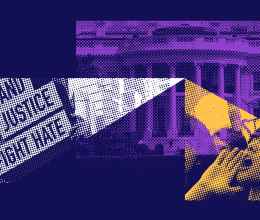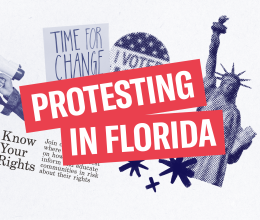
ACLU Files Suit against DeFuniak Springs for Unconstitutional Drug Test Program
FOR IMMEDIATE RELEASE:
November 1, 2012
CONTACT:
ACLU of Florida Media Office,786-363-2737, media@aclufl.org
PENSACOLA - The American Civil Liberties Union (ACLU) of Florida filed a lawsuit yesterday in a federal court on behalf of a DeFuniak Springs city employee who was fired for refusing to submit to the city’s illegal random, suspicionless drug testing program. The testing scheme, which has been in place since February 2010, requires an invasive search and the employees to provide urine on demand and subject to surveillance from a quarter of the city staff on a rotating yearly basis.
In the lawsuit filed Wednesday, October 31, 2012, in U.S. District Court for the Northern District of Florida in Pensacola, the ACLU represents Greg Scoville. For six years, Scoville was the Planning Director for DeFuniak Springs, a desk-job professional position in which he assisted the City in implementing its land use plans. In September 2012, Scoville’s supervisor informed him that he had been randomly selected to submit to a drug test. Scoville refused, citing his belief that the suspicionless testing was a violation of the Fourth Amendment’s protection against unreasonable searches by government. Four days later, the DeFuniak Springs City Council voted to terminate his employment for his refusal to comply with the suspicionless search.
Having read about the legal challenge that halted Governor’s Scott’s March 2011 Executive Order mandating state employees in Executive Branch agencies submit to similar suspicionless drug testing (AFSCME v. Scott), Scoville contacted the ACLU of Florida for assistance.
“It is my hope that the policy will be eliminated so that others will no longer be subject to the same unconstitutional treatment,” stated Scoville. “The city of DeFuniak Springs, and any government, can’t treat employees like suspected criminals simply because we choose to serve in government. Government must understand its limits.”
According to the complaint, “[t]he City’s termination of Scoville violates the Fourth Amendment to the U.S. Constitution, which protects us against intrusive searches without any suspicion and ensures a sphere of personal autonomy and bodily integrity. […] No concrete danger or special need necessitates subjecting Scoville or other office workers to the City’s Random Drug Testing Policy.”
Existing law and court rulings allow for drug testing of certain public employees in “safety-sensitive” positions such as police officers who carry a weapon and train conductors. However, courts have routinely refused to allow the government to invade the privacy of desk-job employees.
“Working for the government does not mean you surrender your constitutional rights for that privilege,” said ACLU Staff Attorney Benjamin Stevenson. “While some private employers may not hold themselves to the same standards, the U.S. Constitution protects us from government intrusions, so when your employer is the government, the Constitution applies at the work place too. It is unfortunate that many private employers do not respect the right to privacy like our founder fathers demanded our government respect it.”
In 2004, the same federal court in which Scoville’s lawsuit is filed found unconstitutional the state’s random drug testing of a long-term planner at the Department of Juvenile Justice. Although Scoville cited this Wenzel v. Bankhead opinion when asking the city to reverse its decision, the city proceeded with the termination. More recently, in April 2012, a federal judge blocked Governor Rick Scott’s executive order requiring random, suspicionless drug testing of state employees brought by the ACLU and the American Federation of State, County, and Municipal Employees (AFSCME).
“Anyone concerned about how much government – at the federal, state and local levels – has intruded into our lives and threatens our freedoms will appreciate why the ACLU is representing Mr. Scoville is and challenging the policies of DeFuniak Springs,” said Howard Simon, Executive Director of the ACLU of Florida. “One of the bedrock principles of our democracy is that if there is no suspicion of wrongdoing, people have a right to be left alone by their government.”
A copy of the ACLU complaint filed yesterday can be found here: http://aclufl.org/pdfs/2012-10-31-ACLU-ScovilleDefuniakComplaint.pdf
A copy of the policy being challenged in the lawsuit can be found here: http://aclufl.org/pdfs/2012-10-31-ACLUFL-DefuniakDrugPolicy.pdf
# # #







